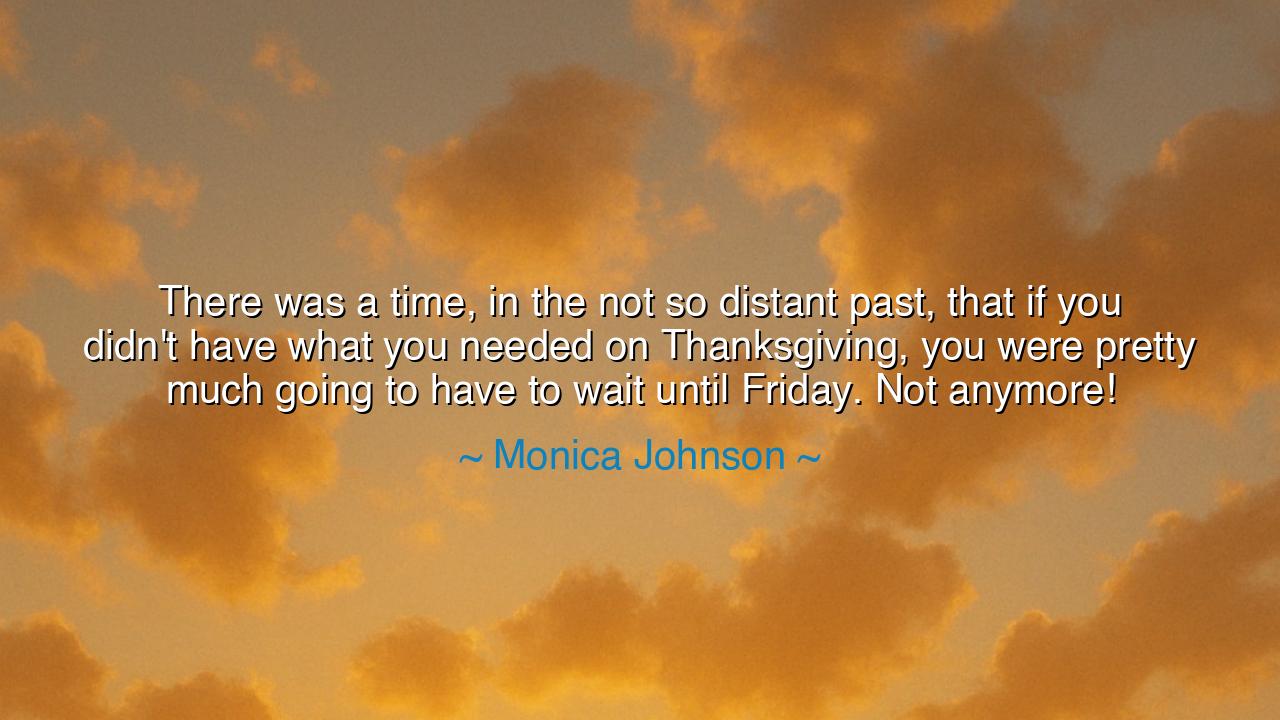
There was a time, in the not so distant past, that if you didn't
There was a time, in the not so distant past, that if you didn't have what you needed on Thanksgiving, you were pretty much going to have to wait until Friday. Not anymore!






In the words of Monica Johnson: “There was a time, in the not so distant past, that if you didn’t have what you needed on Thanksgiving, you were pretty much going to have to wait until Friday. Not anymore!” At first, these words seem a lighthearted remark about shopping and convenience, yet they conceal a deeper reflection on the changing nature of time, tradition, and patience. They remind us that in earlier days, Thanksgiving was sacred, a pause in the rhythm of commerce, when shops closed, streets grew quiet, and families turned inward to the table. To lack something was to endure until morning, to accept limitation and dwell in gratitude with what was at hand.
The ancients knew well the value of such pauses. Festivals and holy days were not for trade, but for reflection and renewal. In Greece, during the Panathenaic Festival, markets ceased; in Rome, on certain holy days, business halted, and citizens gathered for offerings. These rhythms of rest and restraint were essential to the health of the people, for they reminded them that life was more than transactions. Monica Johnson’s words lament, in their humor, that our modern world has erased such pauses—now the stores remain open, the world of buying intrudes even on the day of thanks.
Consider the story of Black Friday, born in the twentieth century as a day of sales following Thanksgiving. Once, it began in earnest on Friday morning, when families, having feasted together, ventured out for bargains. But as years passed, commerce crept backward into Thursday, swallowing the quiet night once reserved for conversation, prayer, and digestion of both food and memory. The sacred pause was broken, replaced with urgency and consumption. What was once a day of waiting has now become a day of rushing.
And yet, the older way held its own kind of nobility. To run out of sugar, or to lack an ingredient for the pie, was not tragedy but a test of gratitude. Families learned to make do, to laugh at their mishaps, to substitute or to go without. These small inconveniences became part of the story, told and retold at future gatherings. The absence of plenty reminded all that abundance is not the true heart of Thanksgiving—the heart is gratitude, togetherness, and the sharing of whatever one has.
Johnson’s exclamation, “Not anymore!”, carries both relief and warning. Relief, for it is easier now to obtain whatever is missing. But warning, because something precious is lost when every desire can be instantly satisfied. The pause that once taught patience, humility, and creativity has been erased. In its place stands a culture that cannot wait, that treats even the sacred as a mere prelude to buying.
The lesson is clear: do not let convenience rob you of meaning. Let Thanksgiving remain a day apart, unhurried and uncluttered by the noise of commerce. Learn again the art of making do, of cherishing the company of family over the abundance of things. For the greatest treasures of the feast are not found in what can be bought at the last minute, but in what is already present—laughter, memory, fellowship, and gratitude.
Practical action lies before us: resist the pull of endless consumption. Keep Thursday as sacred time, even if the world insists it is not. Teach your children to embrace the imperfections of the meal, to find joy in what is given rather than in what is missing. Honor the ancient rhythm of feasting and pausing, so that the holiday may remain not only a table of food, but a table of meaning.
Thus, Monica Johnson’s words, though cast in the light of humor, carry an ancient truth: there was once waiting, and in that waiting, wisdom. We may no longer be forced to wait until Friday, but we can still choose to preserve the spirit of patience, gratitude, and rest. For only in slowing down do we truly taste the feast of the soul.






AAdministratorAdministrator
Welcome, honored guests. Please leave a comment, we will respond soon